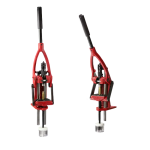PNW: Some good advice, so far. Any of the good quality starter kits, ie: Lee 40th Anniversary, RCBS Rockchucker Supreme, or Hornady Lock & Load, to name just three top choices, will have everything you need, to get started.
As time goes on, you will likely add other pieces to your reloading set up, which will reflect your personal choices. For now though, any of the basic kits will get you on your way.
Note: Right from the start, you should purchase a good quality caliper. Either digital, or dial-type.
One of these will be essential in creating good reloads. For cartridge overall length measurements, etc. There will be other little bits and pieces, ie: inside/outside chamfer tool(Lee makes a good one). Case length gages (Lee), and so on. These can be added, as time goes on.
Then, there are reloading manuals. There is nothing like having a handy loading book....or several, close to hand. For quick reference at the bench. Any of those listed, will have all the information you will need, to get started.
As mentioned, there is plenty of online loading data available, too. One of the best: Hodgdon Reloading Data Center.
If I can add one more reloading data source to the list, it would be the Lyman 51st Edition Reloading Handbook. I just purchased one of these to update my library, and was impressed by the material it contained. Including complete and detailed instructions on every aspect of the reloading process. All of which will be of great help to you, in getting started. I highly recommend it.
A lot of the advice here may seem overwhelming, at first. But, we were all new at the game too, at one time. Take your time. Research all the possible choices thoroughly. Ask plenty of questions. There are many highly experienced reloaders on this forum, that can deliver the answers.
Al
ps: If there is any advice I'd offer to a beginning reloader, it's this: KISS Principle. Keep every step as simple and easy to understand as possible, as you familiarize yourself with the process.







































































